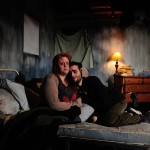 l-r: Nikki Duval, Justin Miller. Photo: Robby Bernstein
l-r: Nikki Duval, Justin Miller. Photo: Robby Bernstein
At 209 Augusta Ave. Down the Alley first door on the right.
Written by Philip Ridley
Directed by John Shooter
Set and Lighting by George Quan
Sound by Thomas Ryder Payne
Cast: Ayinde Blake
Nikki Duval
Yehuda Fisher
Justin Miller
A play about isolation, self-confinement, nightmares and sibling love in a deliciously creepy production.
The Story. Presley and Haley Stray are adult brother and sister living together in a ‘hole’ of an apartment, clinging to each other because they are terrified of going outside. Presley is the braver of the two since he does venture out to shop. Otherwise they stay in the apartment. Their parents are dead. They talk lovingly of them. Haley is extremely anxious and high strung. She is on medication that it seems belonged to the parents. When matters become really bad Presley dips a pacifier into some medicine meant for calming and gives Haley the pacifier. That does the trick. Presley comforts and calms her.
But Presley is also interested in the outside world just to glimpse it, so he peeks through the tears in the paper. He sees an attractive guy on the corner and goes downstairs and invites him in. Matters turn creepy from there.
The Production. The Pitchfork Disney takes place in a site-specific space down the alley at 209 Augusta Ave, first door on the right. When the doors are opened you go up a very steep and narrow stairway. The paint on the stairs is worn and chipped. At the top of the stairs is Presley and Haley’s apartment. Chairs for the audience are on one end on two levels.
George Quan has designed a space so deliciously scuzzy, dark and grungy you are plunged immediately in that world. The windows are covered in torn brown paper to block out the light. The walls are a filthy grey. The furniture is shabby and there is junk everywhere. A table and chairs are to the left and a rumpled bed with dirty sheets on it are to the right. The door up at the back has multiple locks and a chain to keep the world out.
Presley (Justin Miller) and Haley (Nikki Duval) huddle together on the bed. Both are disheveled. Presley is unshaven with dark circles under his eyes making them look hollow. Justin Miller is a tender, fearful Presley and a loving, protective brother of his high-strung, sister Haley. Because of the way that playwright Philip Ridley has written Haley—seemingly like a one noted quiver of emotion–Nikki Duval as Haley seems to give a one noted performance of a woman always on the brink of hysteria. The playwright has not given Duval much wiggle room to play. Duval is an interesting actress and is certainly watchable here. When Presley gives Haley her sedative that will send her to sleep, he can then go and get the man he has been looking at from his window. That man is Cosmo Disney, confident, manipulative, charming, and dazzling in a shimmering red jacket. Disney is a natural performer. Presley is enamoured of him and Cosmo knows it. Cosmo is a man who commands but never wants to be touched. As Cosmo, Ayinde Blake moves like a dancer, manipulates like a hypnotist and is full of danger. When he brings in his partner Pitchfork Cavalier, a nightmare from every S and M flick you never want to see, then the tension and danger ramp up.
The audience is safe of course but the way that director John Shooter has staged and directed this piece has you squirming for all the right reasons.
Comment. This is the fifth show that producer/director John Shooter has directed over the last few years. To say The Pitchfork Disney is unlike anything he has ever directed is an understatement. This is a play about nightmares becoming a reality. It’s a play about people so hidden away in holes in the wall you would not look for them if you needed to, nor could you find them until the smell got bad. The production is typical of John Shooter in that the environment, the set, the world of the play and the actors all serve the play. The care and detail Shooter puts into his productions is a lesson to many directors.
This is Philip Ridley’s first play which he wrote in 1991. He has since gone on to great fame and notoriety. You can tell that The Pitchfork Disney is an early play—it could be cut considerably without loosing any of its punch. Nevertheless, I would recommend The Pitchfork Disney for anyone who likes their theatre to be challenging, engaging, gripping and uncomfortable.
Presented by Precisely Peter Productions.
Opened: May 5, 2016.
Closes: May 22, 2016.
Cast: 4; 3 men, 1 woman
Running Time: 2 hours approx.
www.brownpapertickets.com